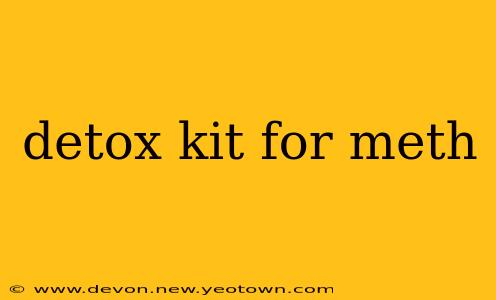Detoxing from Meth: A Journey of Hope and Healing
Methamphetamine addiction is a serious health crisis, leaving individuals struggling with debilitating physical and psychological dependence. The road to recovery is challenging, but it's a journey worth undertaking. While there's no magic "meth detox kit" that will instantly erase the effects of methamphetamine abuse, understanding the process and seeking professional help are crucial first steps. This guide explores the realities of methamphetamine detox, dispelling myths and offering information to aid those seeking recovery.
This isn't a simple process; it's a journey that requires support, patience, and a commitment to long-term health. Let's explore what you need to know.
What is a Meth Detox?
A meth detox isn't something you can buy in a kit. It's a medically supervised process aimed at managing the severe withdrawal symptoms that occur when someone stops using methamphetamine. These symptoms can be incredibly dangerous and even life-threatening, making professional medical care essential. A "detox kit" promoting a quick fix is misleading and potentially harmful. Instead of searching for such products, prioritize finding a reputable medical professional or treatment center.
What are the Symptoms of Meth Withdrawal?
Methamphetamine withdrawal is far from pleasant. Symptoms vary depending on the individual's usage history and other health factors, but they can include:
- Intense cravings: An overwhelming urge to use meth again.
- Depression and anxiety: Severe mood swings, feelings of hopelessness, and overwhelming anxiety.
- Fatigue and lethargy: Extreme tiredness and lack of energy.
- Insomnia or hypersomnia: Difficulty sleeping or excessive sleeping.
- Increased appetite: A sudden increase in hunger.
- Psychomotor agitation or retardation: Restlessness and inability to sit still, or slowed movement and speech.
- Irritability and aggression: Increased anger and difficulty controlling emotions.
- Nausea and vomiting: Physical discomfort and digestive issues.
- Headaches: Persistent and severe headaches.
How Long Does Meth Withdrawal Last?
The duration of meth withdrawal varies. The initial, most intense phase can last several days to a few weeks. However, the psychological cravings and lingering effects can persist for much longer, even months. Consistent support and ongoing treatment are crucial throughout this extended period.
Is Medical Detox Necessary?
Yes, absolutely. Methamphetamine withdrawal can be extremely dangerous, even life-threatening. Medical professionals can monitor vital signs, manage symptoms, and provide medications to ease the discomfort and reduce the risk of complications. Attempting to detox alone is extremely risky and strongly discouraged.
What Happens During Medical Detox?
Medical detox usually involves:
- Stabilization: Managing withdrawal symptoms to prevent dangerous complications.
- Medication: Medications may be used to manage specific withdrawal symptoms, such as anxiety or insomnia. These are prescribed and administered by medical professionals.
- Supportive care: Providing emotional and physical support to the individual undergoing withdrawal.
- Monitoring: Closely monitoring vital signs and overall health.
- Education: Providing education about addiction and recovery options.
What Happens After Detox?
Detox is only the first step. Successful long-term recovery requires ongoing treatment, often including therapy, counseling, and support groups. Relapse is a significant possibility, and having a strong support system is essential to navigate challenges and maintain sobriety.
In Conclusion: There is no shortcut to recovery from methamphetamine addiction. While a "meth detox kit" might seem appealing, the reality is that professional medical detox is essential for safety and successful recovery. If you or someone you know is struggling with meth addiction, seek help immediately. Contact a medical professional, a treatment center, or a local helpline for support and guidance. The journey to recovery is challenging, but with the right support, lasting freedom from addiction is achievable.

